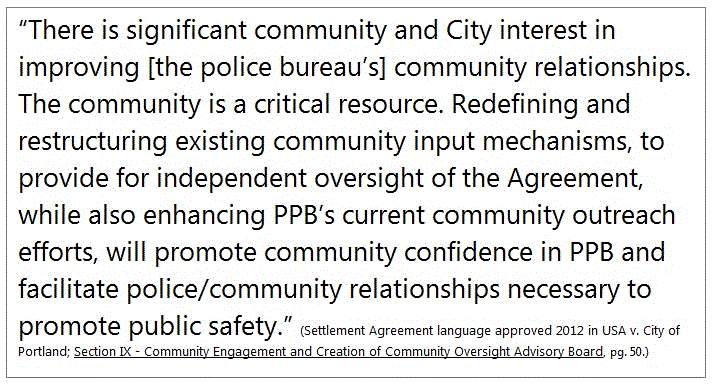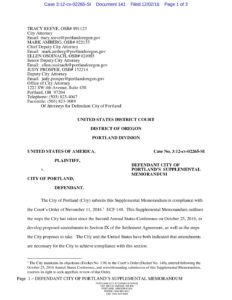City seeks to make police oversight board a non-public entity, shifts focus from dozen failures to comply with a plea deal in USA v City of Portland, Oregon.
Click above to read City Memorandum, dated 2 December 2016.
.
In October 2016, the US Department of Justice, Civil Rights Division here found the City of Portland, Oregon non-compliant with a 2014 plea deal to remedy illegal use of force by police. Former partner Roger David Hardesty had prompted the position. (See DoJ: Plead that Plea Deal Sanctions are Binding) Community partners, led by the Albina Ministerial Alliance Coalition for Justice and Police Reform (here) urged the same conclusion: the City is not complying with Section IX. Community Engagement and Creation of Community Oversight Advisory Board (COAB).
.
.
COAB was loosely based on Consult Hardesty’s reform oversight model, a Civilian Compliance & Reform Authority. As implemented, COAB was never presented opportunity to meet with police command staff nor convene public Town Hall meetings, specifically provided for in the plea deal. Before placing the body on hiatus, the City never entertained a single suggestion brought forth by citizen volunteers. In addition, the City has for 18 months failed to convene a Community Police Relations Committee, tasked with implementing a 2009 Police Plan to Address Racial Profiling (for which Consult Hardesty ably advocated passage). The City’s Human Rights Commission and Committee on Disabilities have failed to perform as assigned. The City and police continue to roll out policy without following defined protocols to make it available in draft stage, while still under consideration. (See Amend Police Union Contract.)
.
.
The DoJ’s 2016 Compliance Assessment found many failures in the City’s reform effort: in Section IX and elsewhere. In the above memorandum, the City Attorney seeks to focus on COAB. The City proposes to replace it with a “significantly smaller,” non-public body. Language in the text box below would have to be eliminated: ‘oversight’ and ‘input’ would no longer be relevant. Read ‘indoctrination’ for training in the memo. It’s another sham ‘observer’ process, subservient to the police bureau’s agenda. The memo makes no reference to plea deal provisions of community-based “authority” to independently assess the Agreement’s implementation; recommend additional actions; advise the Chief and Police Commissioner on strategies.
.
.
The proposed enclave would no longer receive the services of a Community Liaison, currently under contract in Chicago. (See The Fix Comes In.) The perpetrators “circulated a survey and collated the feedback,” yet have not made results public, or made clear who was solicited, and which tools were employed. Having never adopted the required practice of submitting policy in draft stage, the City Attorney’s plan never escaped existing, cloistered community input mechanisms.
.
.
UPDATE: On 7 December, the City for the second time, brought legal challenge to Judge Simon’s authority to order progress reports. On 14 December, the judge canceled a 31 January status conference … at which the above fix was to be presented to the court. (See Judge Cancels Plan to Fix Plea Deal.)
.

.


